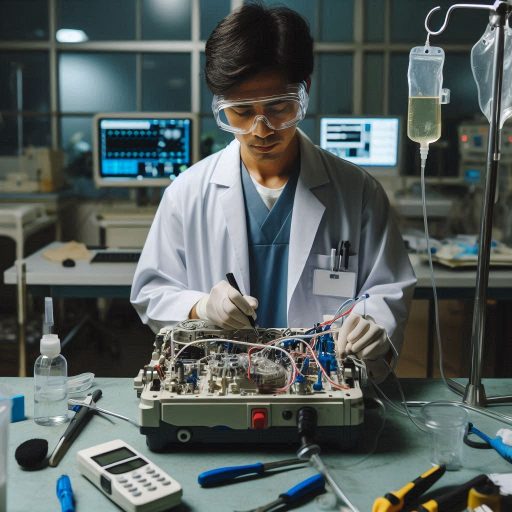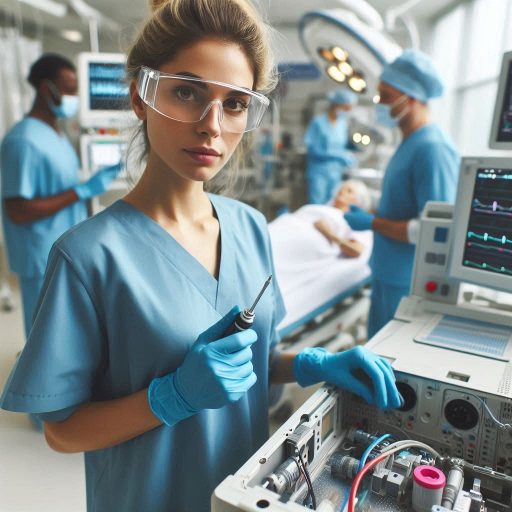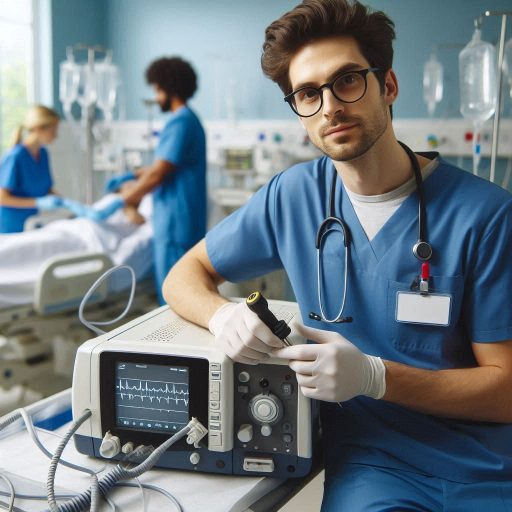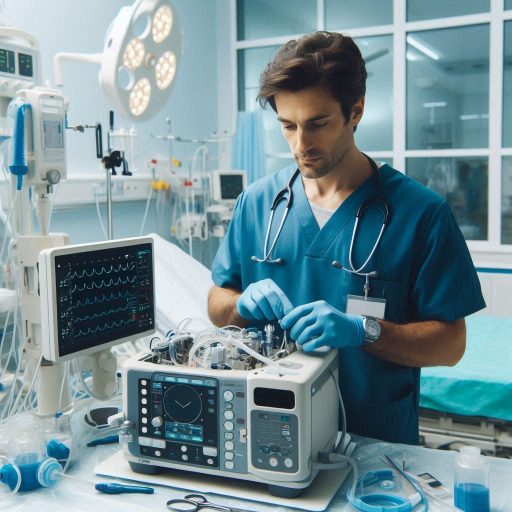Introduction
Biomedical technicians play a crucial role in healthcare systems by maintaining and repairing medical equipment.
They ensure that life-saving machines operate correctly and efficiently.
These technicians conduct routine inspections and preventive maintenance to avoid equipment failures.
When issues arise, they quickly diagnose and fix problems to prevent delays in patient care.
Their work helps hospitals and clinics maintain high standards of medical service.
Regular maintenance reduces the risk of equipment malfunctions, which can lead to treatment delays or inaccuracies.
Biomedical technicians also handle equipment calibrations, ensuring precise measurements and reliable performance.
Their expertise extends to installing new devices and training staff on proper usage.
By ensuring equipment reliability, they contribute to overall patient safety and care quality.
Technicians also manage equipment inventories, ensuring that all devices are available and functional when needed.
Without their skilled intervention, the risk of equipment breakdowns and operational inefficiencies would increase significantly.
In essence, biomedical technicians provide the technical backbone that supports uninterrupted healthcare delivery.
Their role is indispensable for maintaining the seamless operation of essential medical technologies.
What is a biomedical technician
Definition of a Biomedical Technician
A biomedical technician is a professional who manages and maintains medical equipment.
They ensure that machines operate correctly and safely.
Biomedical technicians play a vital role in healthcare systems.
They work in hospitals, clinics, and laboratories.
Their job involves repairing and calibrating medical devices.
They also provide technical support to healthcare staff.
By ensuring equipment functionality, they contribute to patient care quality.
Educational Requirements and Training
To become a biomedical technician, one typically needs a relevant degree.
An associate‘s degree in biomedical equipment technology is common.
Some may pursue a bachelor’s degree for advanced opportunities.
Accreditation from a recognized program is essential.
Many employers also value certification from professional organizations.
Certification often requires passing an exam and fulfilling experience requirements.
On-the-job training is crucial for developing specific skills.
Internships or entry-level positions provide practical experience.
Continuous education helps technicians stay updated on technological advancements.
Skills and Qualities Required for the Job
Biomedical technicians need a blend of technical and interpersonal skills.
Strong problem-solving abilities are crucial for diagnosing equipment issues.
Attention to detail ensures accuracy in repairs and maintenance.
Technicians must be familiar with various medical devices and technologies.
Good communication skills help them explain technical issues to healthcare staff.
Mechanical aptitude allows for effective equipment handling and repairs.
Troubleshooting skills are essential for quickly identifying and fixing problems.
Patience and persistence help in managing complex technical challenges.
Organizational skills assist in managing multiple tasks efficiently.
Adaptability is key in a field with rapidly evolving technology.
Empathy and a customer-focused attitude enhance interactions with patients and healthcare providers.
Biomedical technicians are indispensable to modern healthcare systems.
They combine education, training, and personal attributes to ensure medical equipment performs optimally.
Their skills and dedication support healthcare professionals and improve patient outcomes.
Read: CAD Technician Salary: What to Expect in the USA
Duties and Responsibilities of Biomedical Technicians
Overview of the Tasks Performed by Biomedical Technicians
Biomedical technicians play a vital role in maintaining the functionality of medical equipment.
Their tasks ensure that healthcare systems operate smoothly and efficiently.
These technicians are skilled professionals who work with a range of sophisticated machinery.
They perform inspections, repairs, and calibrations on various devices.
Equipment Handled by Biomedical Technicians
Biomedical technicians work on numerous types of medical equipment.
One common device is the X-ray machine.
Technicians ensure these machines produce accurate images for diagnosis.
They also maintain ventilators, which support patients‘ breathing.
Proper functioning of ventilators is crucial for patient survival.
Another critical piece of equipment is the defibrillator.
Technicians make sure these devices are ready to deliver shocks when needed.
Importance of Regular Maintenance and Calibration
Regular maintenance and calibration of medical equipment are essential for several reasons.
First, it ensures that the equipment functions accurately.
Regular checks help detect issues before they become major problems.
This proactive approach prevents equipment failures during critical moments.
Secondly, calibration ensures that medical measurements are precise.
Accurate measurements are vital for correct diagnosis and treatment.
Finally, routine maintenance extends the lifespan of medical equipment.
This practice helps avoid costly replacements and repairs.
Biomedical technicians play a crucial role in this process.
They schedule and perform regular maintenance tasks to keep equipment in optimal condition.
By calibrating devices, they make sure that all readings are accurate and reliable.
These actions help maintain high standards of patient care.
Without their expertise, the risk of equipment malfunction increases.
This can lead to delayed treatments or incorrect diagnoses.
Therefore, biomedical technicians support healthcare systems by handling a variety of medical devices.
Their work on X-ray machines, ventilators, and defibrillators is essential for maintaining operational efficiency.
Regular maintenance and calibration of these devices are critical for accurate patient care and equipment longevity.
Their role in healthcare is indispensable, ensuring that medical equipment remains reliable and effective.
Read: Top CAD Software for Aspiring CAD Technicians
How biomedical technicians support healthcare systems
Ensuring Medical Equipment Functions Properly
Biomedical technicians play a crucial role in healthcare systems by ensuring medical equipment functions properly.
They perform regular maintenance and thorough inspections to verify equipment reliability.
Accurate diagnoses and effective treatments depend on the precision of these machines.
Technicians calibrate and test devices to ensure they meet the required standards.
They identify and address any discrepancies immediately to maintain diagnostic accuracy.
Regular servicing prevents minor issues from escalating into major problems.
By ensuring equipment reliability, technicians help clinicians provide the best possible care.
Preventing Equipment Breakdowns
Preventing equipment breakdowns is a vital aspect of a biomedical technician‘s role.
Technicians schedule preventive maintenance to reduce the risk of equipment failure.
They replace worn-out parts before they cause operational issues.
Routine inspections help catch potential problems early.
Technicians follow strict protocols to ensure all equipment functions optimally.
This proactive approach minimizes the chances of unexpected breakdowns.
By addressing issues before they escalate, technicians avoid disruptions in patient care.
Their efforts keep healthcare services running smoothly, ensuring continuous and reliable patient support.
Contributing to Cost Savings
Biomedical technicians contribute significantly to cost savings in healthcare systems.
They repair equipment instead of opting for costly replacements.
Timely repairs extend the life of expensive medical devices.
Technicians use their expertise to fix malfunctions and restore equipment functionality.
This approach helps healthcare facilities manage their budgets more effectively.
By repairing rather than replacing, technicians reduce overall equipment costs.
Their work helps allocate financial resources more efficiently within the healthcare system.
Cost savings from repairs can be redirected to other essential areas of patient care.
Biomedical technicians are integral to maintaining the quality and efficiency of healthcare systems.
Their expertise in ensuring equipment functionality, preventing breakdowns, and contributing to cost savings enhances patient care and system reliability.
Through their diligent efforts, they play a key role in the healthcare ecosystem.
Read: How to Become a CAD Technician: Step-by-Step Guide
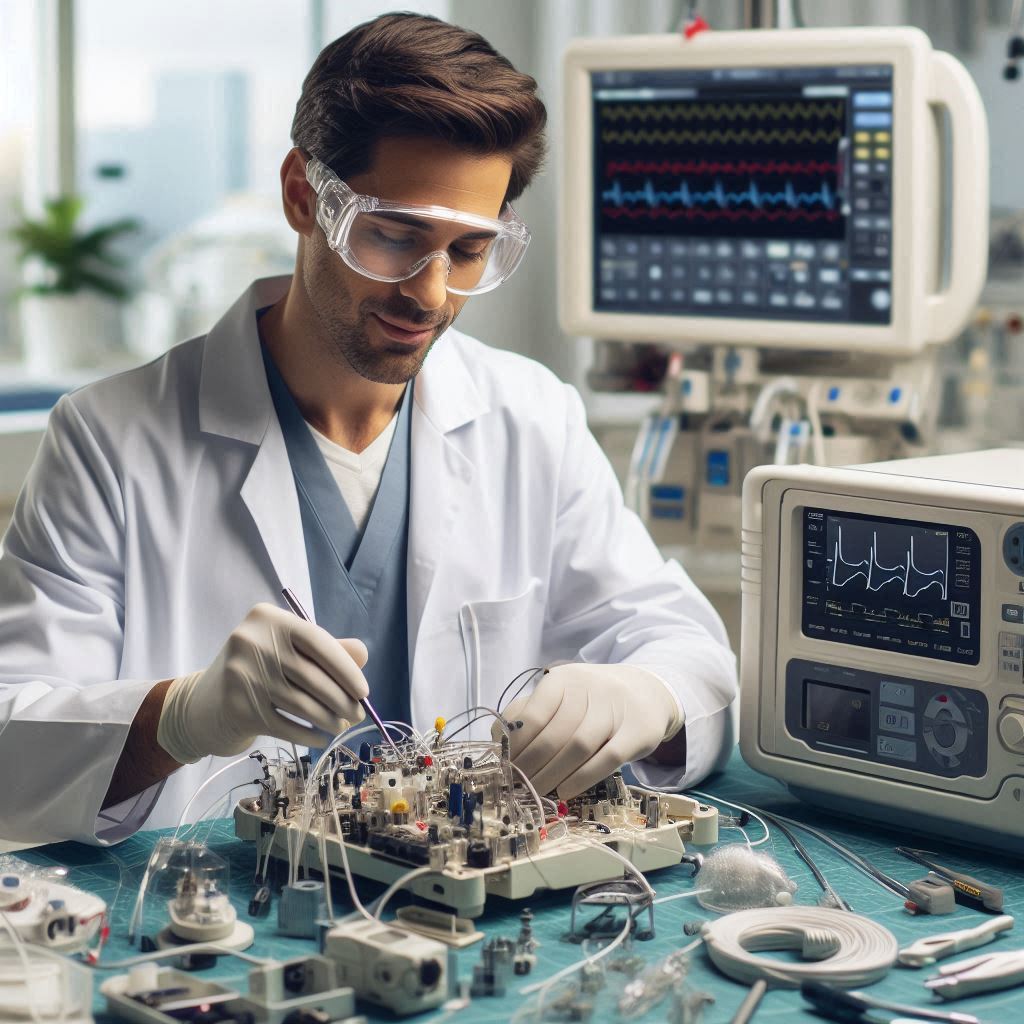
Collaboration with other healthcare professionals
Working with Medical Staff to Understand Equipment Needs
Biomedical technicians play a crucial role in healthcare systems by collaborating closely with doctors, nurses, and other medical staff.
They engage directly with these professionals to assess and understand their equipment needs.
This collaboration ensures that medical equipment meets the specific requirements of various departments.
By working together, technicians gain insights into how equipment supports patient care and identify any gaps in functionality.
Understanding these needs helps in prioritizing equipment upgrades and repairs.
Technicians attend meetings and discussions with healthcare staff to stay informed about evolving requirements.
This ongoing dialogue fosters a more responsive and effective healthcare environment.
Providing Training on Equipment Usage and Maintenance
Training healthcare personnel on equipment usage and maintenance is a key responsibility of biomedical technicians.
They conduct training sessions to ensure staff are proficient with medical devices.
This training covers proper operation, safety protocols, and basic troubleshooting.
Well-trained personnel can handle equipment more effectively, reducing the risk of misuse or damage.
Technicians also provide guidance on routine maintenance tasks to extend the lifespan of medical devices.
They create user-friendly manuals and instructional materials to support learning.
Effective training enhances the overall efficiency of healthcare operations and improves patient outcomes.
Technicians often offer refresher courses to keep staff updated on new technologies.
Participating in Interdisciplinary Teams to Improve Patient Care
Biomedical technicians are integral members of interdisciplinary teams aimed at improving patient care.
They collaborate with physicians, nurses, and other specialists to enhance medical equipment performance.
Their technical expertise contributes to developing solutions for complex patient care challenges.
Technicians participate in team meetings to discuss equipment-related issues and propose improvements.
They provide valuable input on how technology can better support patient diagnostics and treatment.
By working within these teams, technicians help ensure that all equipment functions optimally and meets patient care standards.
Their involvement supports a holistic approach to healthcare, benefiting both staff and patients.
Biomedical technicians bridge the gap between technology and patient care.
Their efforts in understanding equipment needs, training staff, and participating in interdisciplinary teams are essential for a well-functioning healthcare system.
Through their expertise and collaboration, they enhance the efficiency and effectiveness of medical services, ultimately contributing to improved patient outcomes and overall healthcare quality.
Read: Surveying and Mapping Technician Internships: A Guide
Discover More: Environmental Engineers in Renewable Energy Projects
Learn More: Women in Environmental Engineering: Challenges and Successes
Find Out More: Top Skills for Biomedical Engineers
Transform Your Career Today
Unlock a personalized career strategy that drives real results. Get tailored advice and a roadmap designed just for you.
Start NowChallenges Faced by Biomedical Technicians
Biomedical technicians play a crucial role in supporting healthcare systems by maintaining and repairing medical equipment.
However, they encounter several challenges in their day-to-day work, which can impact the efficiency and effectiveness of healthcare operations.
Dealing with Complex and Constantly Evolving Technology
One of the biggest challenges that biomedical technicians face is keeping up with the advancements in medical technology.
As medical equipment becomes more complex and sophisticated, technicians must constantly.
Update their skills and knowledge to ensure they can effectively troubleshoot and repair the equipment.
Moreover, technological advancements often mean that new types of medical equipment are introduced regularly, which adds to the workload of technicians.
They must familiarize themselves with the operation and maintenance of these new devices to provide timely and accurate support to healthcare providers.
Balancing Urgent Repairs with Regular Maintenance Tasks
Biomedical technicians are often faced with the challenge of balancing urgent repair requests with scheduled maintenance tasks.
They must prioritize critical equipment that directly impacts patient care while also ensuring that routine maintenance is performed to prevent breakdowns and prolong the lifespan of medical devices.
This balancing act can be stressful for technicians, especially in high-pressure healthcare environments where downtime can have serious consequences.
Biomedical technicians must develop effective time management skills and communication .
Healthcare staff to address urgent repairs without neglecting routine maintenance tasks.
Ensuring Compliance with Regulations and Standards for Medical Equipment
Another significant challenge for biomedical technicians is ensuring that medical equipment meets regulatory requirements and industry standards.
Healthcare facilities are subject to strict regulations to ensure the safety and quality of patient care, and technicians are responsible for ensuring that medical devices comply with these standards.
Technicians must stay updated on the latest regulations and standards set by organizations such as the Food and Drug Administration (FDA).
They must also ensure that equipment maintenance and repair practices adhere to these guidelines to prevent regulatory violations and ensure patient safety.
Biomedical technicians face several challenges in supporting healthcare systems, from dealing with complex technology to prioritizing urgent repairs.
By addressing these challenges effectively, technicians can contribute to the smooth functioning of healthcare operations and enhance the quality of patient care.
Opportunities for career growth and advancement
Specialization Options Within Biomedical Technology
Biomedical technicians can choose from various specializations, each focusing on critical areas of healthcare technology.
Imaging equipment stands out as a key specialization.
Technicians in this field maintain and repair devices like MRI machines and CT scanners.
These experts ensure precise imaging, crucial for accurate diagnoses.
Another important specialization is surgical instruments.
Technicians here work with complex tools used in surgeries.
They guarantee these instruments function flawlessly, supporting successful surgical outcomes.
Specialists also focus on laboratory equipment.
They handle devices that analyze blood samples and other tests.
Their role is vital for accurate laboratory results.
Some technicians specialize in patient monitoring systems, which track vital signs in real time.
These specialists ensure continuous and accurate monitoring, vital for patient care.
Continuing Education Opportunities
To stay current with advancements in medical technology, biomedical technicians must engage in continuing education.
Technology in healthcare evolves rapidly, and ongoing learning is crucial.
Technicians can attend workshops and conferences to gain new skills.
These events offer insights into the latest technology and industry trends.
Online courses also provide flexibility for busy professionals to update their knowledge.
Many organizations offer certification programs to validate advanced skills and knowledge.
Technicians might also pursue advanced degrees in biomedical engineering or related fields.
These programs provide deeper knowledge and open up new opportunities.
By participating in research and development projects, technicians can contribute to groundbreaking advancements in medical technology.
Staying current helps them maintain their expertise and deliver high-quality support.
Potential for Leadership Roles
Biomedical technicians have significant potential for leadership roles within healthcare organizations.
With experience and advanced education, they can move into managerial positions.
These roles involve overseeing teams of technicians and managing equipment maintenance schedules.
Leadership positions require a deep understanding of technology and excellent organizational skills.
Technicians can also become consultants, advising healthcare facilities on technology upgrades and best practices.
As technology evolves, technicians can lead projects that implement new systems and ensure seamless transitions.
Leadership roles also include working with manufacturers to improve equipment and introduce innovations.
Moreover, technicians in leadership positions often drive training programs for new staff.
They ensure that all team members are proficient with the latest technology.
This training role is crucial for maintaining high standards and improving patient care.
Biomedical technology offers diverse specialization options, from imaging equipment to surgical instruments.
Continuing education is essential for staying current with technological advancements.
With the right experience and education, technicians can take on significant leadership roles, shaping the future of healthcare technology.
Conclusion
Biomedical technicians play a vital role in healthcare systems.
They ensure that medical equipment functions correctly and safely.
Regular maintenance and prompt repairs prevent costly equipment failures.
Their work directly impacts the quality of patient care.
By ensuring machines operate efficiently, technicians help doctors deliver accurate diagnoses and effective treatments.
These professionals often work behind the scenes, but their contributions are essential to daily operations.
Without their expertise, healthcare facilities would struggle to maintain high standards of care.
The reliability of medical equipment depends heavily on their skills and dedication.
Their efforts often go unrecognized, yet they are crucial to every successful medical procedure.
We must appreciate the dedication of biomedical technicians in healthcare.
They safeguard patient well-being through their meticulous work.
Recognizing their importance fosters greater respect for their profession.
As readers, consider how essential biomedical technicians are in your healthcare system.
Support their efforts and advocate for their recognition.
Their work enhances the quality of care we all rely on.
Let‘s honor their commitment and ensure they receive the acknowledgment they deserve.
[E-Books for Sale]
The Big Book of 500 High-Paying Jobs in America: Unlock Your Earning Potential
$19.99 • 500 High-Paying Jobs • 330 pages
Explore 500 high-paying jobs in America and learn how to boost your career, earn more, and achieve success!
See All 500 High-Paying Jobs of this E-Book
1001 Professions Without a Degree: High-Paying American Jobs You Can Start Now
$19.99 • 1001 Professions Without a Degree • 174 pages
Discover 1001 high-paying jobs without a degree! Unlock career tips, skills, and success strategies for just $19.99!

